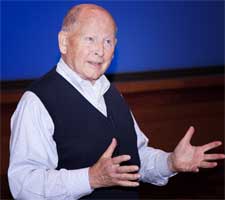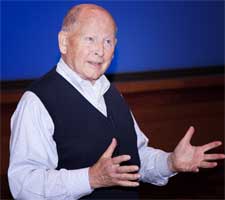 NARRAGANSETT, R.I. – October 3, 2014 – H. Thomas Rossby, a retired professor at the University of Rhode Island’s Graduate School of Oceanography, was awarded an honorary doctorate from Stockholm University at ceremonies on Sept. 26. He was recognized for his distinguished career as a scientist and for his long record of collaborating on research and teaching at the Swedish university’s Department of Meteorology.
NARRAGANSETT, R.I. – October 3, 2014 – H. Thomas Rossby, a retired professor at the University of Rhode Island’s Graduate School of Oceanography, was awarded an honorary doctorate from Stockholm University at ceremonies on Sept. 26. He was recognized for his distinguished career as a scientist and for his long record of collaborating on research and teaching at the Swedish university’s Department of Meteorology.
A native of Boston who now lives in Saunderstown, Rossby is an international leader in the study of ocean circulation, especially the Gulf Stream, and how it affects weather and climate around the world. Not only did he conduct research on ocean circulation, but he also invented numerous devices and techniques for doing this research.
Rossby’s scientific contributions include the development and deployment of neutrally buoyant floats that use an underwater acoustic navigation system to track their movements. He later partnered with URI Electrical Engineering Professor Godi Fischer to develop instruments that use the same navigation system to monitor fish movements. Later in his career he established an international program that uses instruments mounted on commercial ships to regularly measure ocean currents as the ships cross the ocean repeatedly between two ports.
Rossby has earned many of the highest honors bestowed upon scientists in his discipline, including the Ewing Medal from the American Geophysical Union, the Munk Award from The Oceanographic Society, and the Suomi Award from the American Meteorological Society. He is a fellow of the National Academy of Engineering, the American Academy of Arts and Sciences, and a foreign member of the Norwegian Academy of Sciences. He earned his engineering degree in applied physics at the Royal Institute of Technology in Stockholm and a doctorate in oceanography at the Massachusetts Institute of Technology.
Rossby retired from the Graduate School of Oceanography in 2011, but he continues to maintain an active research program.

